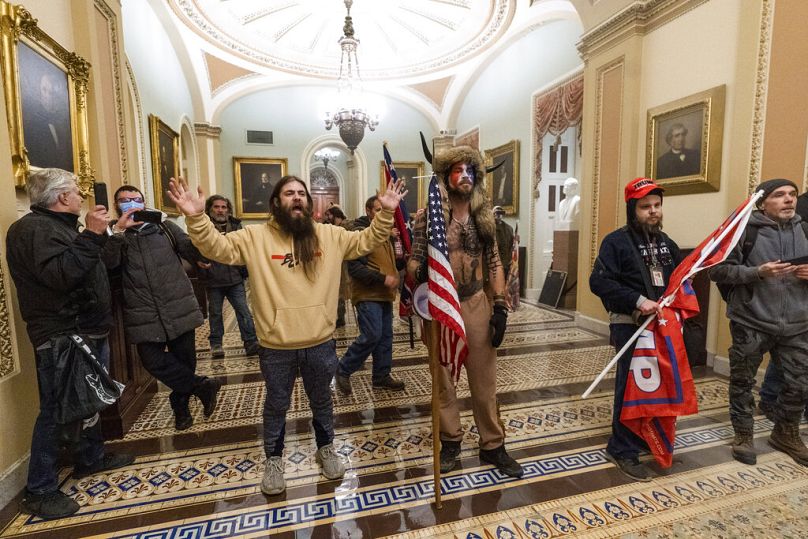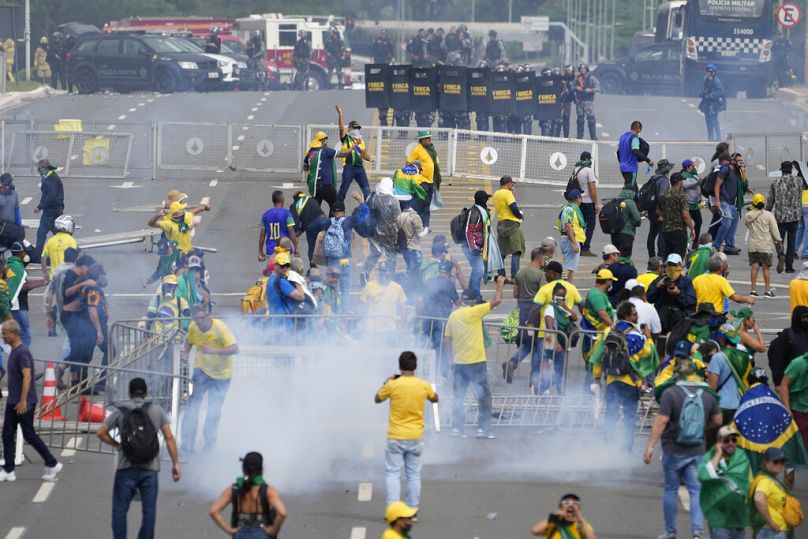What are the similarities and differences between riots in Brazil's capital that attacked democratic institutions, and the 6 January 2021 attack on the Capitol in Washington DC?
On Sunday, demonstrators supporting Brazil's nationalist former President Jair Bolsonaro stormed Congress and government buildings in Brasilia to overturn an election which brought leftist leader Luiz Inácio Lula da Silva to power earlier this month.
The rioters ransacked political buildings -- while parading the Brazilian flag with its motto 'ordem e progresso', 'order and progress' -- in a botched attempt to reverse the peaceful transfer of power.
The biggest assault on Brazil's democracy in decades, news of Sunday's uprising has sent shockwaves around the world. But what has most alarmed many are the echoes of the US uprising almost exactly two years prior, when supporters of Republican ex-President Donald Trump stormed the Capitol in Washington DC on 6 January in an attempt to prevent Joe Biden from taking office.
The similar timing of the events has led commentators and analysts to draw comparisons between the two events. But are the uprisings as similar as they seem?
At a glance, it would certainly appear the two incidents bear an uncanny resemblance with each other.
The storyline they share is remarkably similar. In both cases, a far-right, firebrand president with a fondness for using Twitter, contests his loss in a democratic election, propagating falsehoods and conspiracy theories to his devoted supporter base.
Upon the dawn -- or eve, in the US -- of his successor's inauguration, such sentiment eventually morphs into a violent uprising which targets the very buildings at the heart of both nations' democratic systems.
Windows are smashed, artwork and landmarks are damaged -- in Brazil's case, even its own 1988 constitution -- all by demonstrators draped in their respective nation's star-spangled flag.
At the heart of both uprisings lies a similar nationalist ideology which has a history of resisting democratic transfers of power.
"A pathetic copy cat [sic] attempt at a coup by Bolsonaro," were the words used by Argentine historian Federico Finchelstein, an expert in fascist history, to describe Sunday's events.
Consequently, both Biden and Lula have fiercely condemned the demonstrators, labelling them as extremists and threats to their countries' safety. The latter, however, went one step further, calling them "fascists" - a loaded word US leaders have generally hesitated to use.
Ultimately, both events see each country's ousted leader somehow landing in the same place -- Florida. While Trump may have found refuge in his mammoth Mar-a-Lago residence, Bolsonaro's fate appears somewhat less glamorous, as the ex-President was allegedly spotted eating chicken wings at an Orlando KFC restaurant.
Nevertheless, while comparisons between Brazil and the US's anti-democratic riots may be apt, key differences do remain.
It is worth noting the different timings of the two uprisings. The storming of the Capitol happened a fortnight before Biden's inauguration, while Brazil's uprising happened over a week after Lula took office. The former represented an attempt to hinder the transfer of power, the latter aimed to overturn it.
Brazil uprising also targeted another key -- the Presidential Palace. The White House, where Trump still officially resided on 6 January 2021, remained untouched.
But perhaps the biggest different remains in the starkly different socio-political contexts which surround the events.
As a country whose democracy has not suffered from major upheavals over the past century, 6 January has come to haunt the US's public memory as a particularly dark moment, one that is often the source of intense media and academic debates.
Brazil, on the other hand, has a more turbulent relationship with democracy, which itself was only formally reintroduced in 1985, after a 21-year military dictatorship. The century it leaves behind is punctuated with revolutions, coups and uprisings, and its history is one of greater political instability than the US.
The military itself has played a starkly different role in both country's anti-democratic uprisings. Former members of the armed forces may have been implicated in the US Capitol attacks, but in Brazil, high-ranking military officials supported the pro-Bolsonaro protests that preceded the riots, albeit falling short of participating in Sunday's riots themselves.
"I think it is fair to say that segments of Brazil’s military were encouraging what happened," wrote US-based historian Rafael Ioris. "But when it came down to it, the armed forces were quiet."
Such differences between both countries, in turn, could result in the aftermaths of both events looking quite dissimilar.
The US justice system took a hard-line approach in dealing with its own insurrectionists, hundreds of whom were sentenced. They were consequently condemned by much of the press -- although the severity of the 6 January 2021 attacks remains more controversial among conservatives.
Lula may promise a similar iron-fist approach, telling reporters that "all the people who did this will be found and punished." But as Brazil's own attempted coup may involve individuals high up the country's political food chain, whether such promises actually come to fruition remains to be seen.













